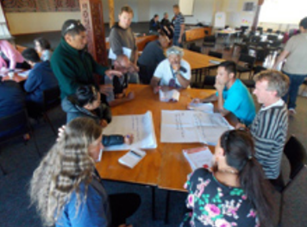Week 6 - People
Completion requirements
6. Consultation Principles
 A number of principles that help define the meaning of good consultation have emerged from case law under the RMA:
A number of principles that help define the meaning of good consultation have emerged from case law under the RMA:- Early – consult as soon as possible when the details of your proposal are less ‘set in concrete’ and you have more flexibility to make changes to address issues raised by interested and affected persons.
- Transparent – be open about what you want to achieve, what scope you may have to change certain aspects of your proposal, and why there might be elements that you may not be able to change.
- Open mind – keep your views open to people’s responses and to the benefits that might arise from consultation.
In addition to these, it is worth noting that the following points will help your consultation process:
- Two-way process – consultation is intended as an exchange of information and requires both you and those consulted to put forward their points of view, and to listen to and consider other perspectives.
- Not a means to an end – while consultation is not an open-ended, never-ending process, it should not be seen merely as an item on a list of things to do that should be crossed off as soon as possible.
- Ongoing – it may be that consultation, or at least ongoing communication, will continue after your application has been lodged or even after a decision has been made.
- Agreement not necessary – consultation does not mean that all parties have to agree to a proposal, although it is expected that all parties will make a genuine effort. While agreement may not be reached on all issues, points of difference will become clearer or more specific.
The benefits of consultation include:
- Improving outcomes
- Gaining local knowledge – consultation may reveal information on a range of issues (including things such as local traffic or flooding conditions) that is important to your proposal but that you might not otherwise be aware of.
- Incorporating tāngata whenua values and interests there may be matters of significance to Māori, such as traditional burial sites, that can be accommodated into your proposal.
- Enhanced proposals and improved environmental outcomes – consultation may provide input that will improve your project or idea and reduce its impact on the natural, physical, cultural and social environment.
- Making the consent process easier – consultation may lessen any concern, doubt or confusion people may have about your proposal (in the absence of accurate information). This can reduce potential opposition, and improve the chances of consent being non-notified and granted.
Tāngata whenua
This is an extremely important part of the consultation process in New Zealand for the following reasons:
- Benefit by understanding the Māori world view – tāngata whenua (iwi, hapū, whānau) have a long-standing association with the natural environment. Understanding these cultural values and interests can result in improved proposals.
- Unique to New Zealand and our national identity – tāngata whenua participation in the resource consent process can foster kaitiakitanga (the exercise of guardianship expressed in part through an ethic of stewardship) and other Māori concepts that are unique to our country. These may be used to enhance your proposal.
- Helping council assess RMA obligations – ensure the council can see how your proposal has addressed RMA requirements relating to Māori and the Treaty of Waitangi, and strengthen relationships.